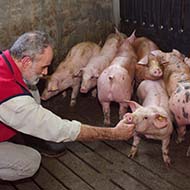Temporary visas to help tackle pig backlogs

The NPA believes that some 6,000 pigs have been culled so far on farms owing to a lack of space.
Up to 800 overseas butchers will be eligible to apply for temporary visas to help ease the backlog on UK pig farms, the Government has announced.
Under the plans, pork butchers will have until 31 December to apply for visas from the existing allocation in the Seasonal Workers Pilot Scheme, allowing them to travel and work in the UK for six months.
The Government said the move is ‘not a long term solution’ and businesses 'must make long term investments in the UK domestic workforce to build a high-wage, high-skill economy, instead of relying on overseas labour.'
It forms part of a package of measures announced by the Government on Thursday (14 October) to ease the growing pressure on the pig sector. The NPA believes that around 6,000 pigs have been culled so far on farms owing to a lack of space.
Reacting to the announcement, NPA chief executive Zoe Davies said: "We are so very relieved that the Government has finally released some measures aimed at reducing the significant pig backlog on farms.
"We are working with the processors to understand the impact of these new measures and to determine exactly what will happen now, and how quickly, so that we can give pig farmers some hope and stem the flow of healthy pigs currently having to be culled on farms."
Other measures announced on Thursday include a Government-funded private storage aid scheme in England. The scheme will enable meat processors to store slaughtered pigs for three-six months, so they can be preserved safely and processed at a later date.
The Government has also pledged to work with the pig industry to introduce processing of animals on Saturdays and longer working days where possible.
Defra secretary, George Eustice, said: “A unique range of pressures on the pig sector over recent months such as the impacts of the pandemic and its effect on export markets have led to the temporary package of measures we are announcing today. This is the result of close working with industry to understand how we can support them through this challenging time.”



 The Animal and Plant Health Agency (APHA) has updated its online reporting service for dead wild birds.
The Animal and Plant Health Agency (APHA) has updated its online reporting service for dead wild birds.